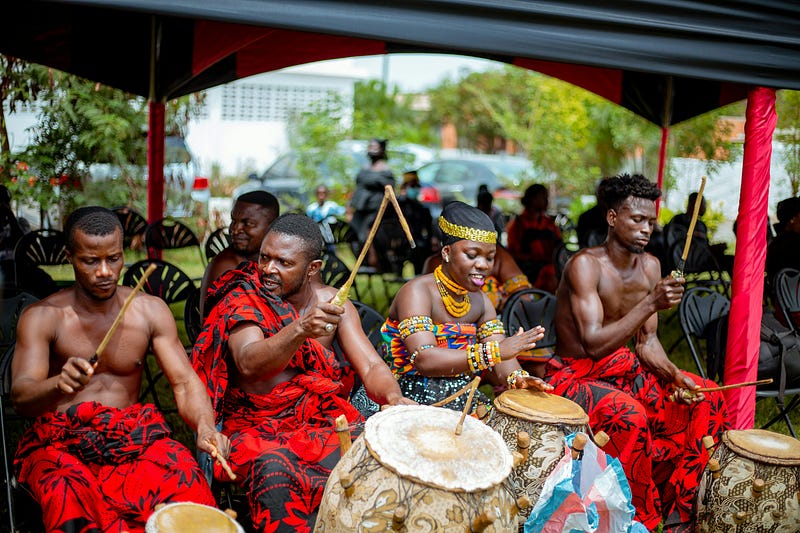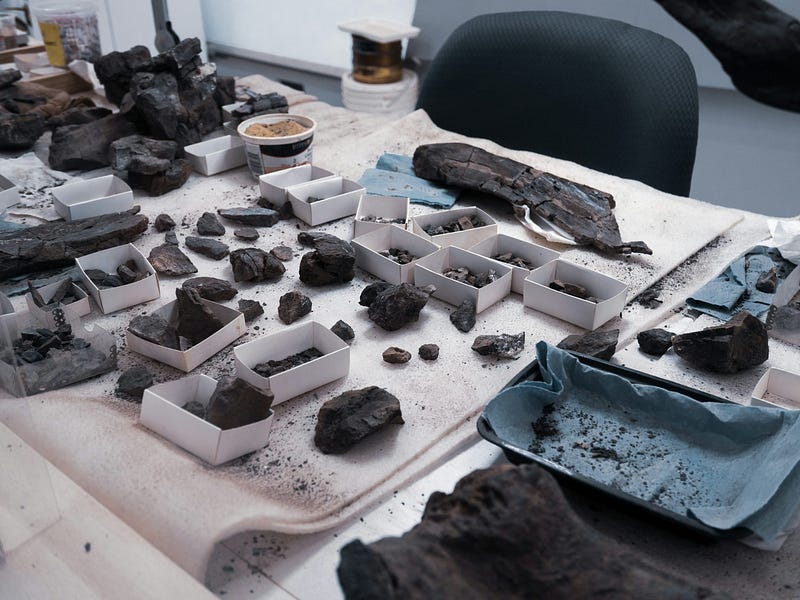Exploring the Origins of Africans: A Journey Beyond Borders
Written on
Chapter 1: Understanding My Heritage
For quite some time, I have been intrigued by the ancestry of my people and various ethnic groups in Africa. As a member of the Akan community predominantly located in modern-day Ghana, Ivory Coast, and Togo, I have sought to uncover our historical roots.

Akan people of Ghana by Ransford Quaye
Years ago, I encountered oral histories from community elders suggesting that our ancestors migrated to West Africa from regions outside of Africa, particularly near Israel. According to these accounts, our journey began through Egypt and Nubia before we settled in West Africa.
Oral traditions have long served as vital methods for preserving knowledge in many African cultures, especially in light of historical events that led to the destruction of written records, such as the Arab Muslim invasion and the Spanish Inquisition. This rich heritage of storytelling remains resilient and unbroken through time.
When discussing these migration narratives with relatives, I found a surprising acceptance of this perspective, even if it diverges from the commonly held views among the Akan. Furthermore, I discovered similar oral traditions among various groups in Ghana and other African nations. This revelation sparked my quest for understanding this often-overlooked history.
Wars, Invasions, and Natural Disasters
Africa has experienced numerous significant events that have shaped our perceptions of the continent, including ancient migrations.

Al Ahram, Egypt by Simon Berger
As I examined historical records for instances of these migrations, I uncovered many intriguing occurrences. What astonished me the most was how often history either corroborated or contradicted these oral accounts. I also began to notice fascinating parallels between linguistic and genetic evidence and these historical narratives.
Recent advancements in archeogenetics and paleogenetics have yielded intriguing insights into human origins. A significant finding is that a majority of Africans belong to the E haplogroup, indicating a shared lineage traced back to ancient ancestors with the E genetic marker.
Interestingly, evidence suggests that this E haplogroup did not originate in Africa.
The first startling discovery was that no E fossils older than those found outside Africa have been located within the continent. I have challenged critics to disprove this assertion, and esteemed geneticists such as Dr. Eran Erhalk, Dr. Peter Revesz, and Razib Khan have supported this notion.
The oldest E fossil discovered in Africa, known as Mota Man, was unearthed in Ethiopia and dates back to around 3,500 BC. Mota Man belonged to the E1B1 haplogroup, from which the E1b1a and E1b1b mutations originated. These markers are prevalent across the continent and encompass many Bantu-speaking populations, as well as significant groups like the Igbo and Yoruba.
This suggests a common male ancestor for these populations. Africa's genetic diversity reflects a complex history of multiple migrations into the region.

Addis, Ababa, Ethiopia by Daniel Emale
The implication is that the E haplogroups did not appear in Africa until after the Bronze Age. The late Neolithic or Chalcolithic period began around 4,500 BC, followed by the Bronze Age around 3,500 BC, which led to the decline of Neolithic cultures.
E1B1: The Middle Eastern Connection
In future discussions, I will elaborate on how the E1B1 haplogroup is linked to an ancient agricultural civilization from the Middle East. Fossils related to this group have been discovered across various regions, including Western Europe, long before any were found in Africa.
There has been a longstanding effort to categorize E haplogroups as exclusively African, despite the presence of diverse groups across Africa even before what is termed the 'Bantu expansion.' This expansion represents a significant migration of E haplogroups into Africa from the Middle East over a millennia, which resulted in the displacement of several indigenous populations, including the Khoi Khoi, San, and Pygmies.
Given the extensive time frame involved, it follows that there must exist historical records to validate and clarify the genetic studies derived from fossil evidence. I have identified numerous sources that provide such insights.
Many individuals overlook fossil evidence, leading them to assume that the prevalence of E haplogroups in Africa signifies a purely African origin. However, migration has always been a constant in human history, and populations do not simply emerge from the ground or remain static.

Paleontology, coal, fossils by Yena Kwon
While many geneticists are aware of this reality, the prevailing narrative that groups identified as 'African' originated solely in Africa often goes unchallenged. This perspective contradicts popular theories.
When examining the origins of specific ethnic groups, it is crucial to consider the presence of fossil evidence. The common belief is that most Africans originated from East Africa; however, fossil findings do not substantiate this claim.
In a series of upcoming posts, I will delve deeper into this subject, aligning history with archeogenetic findings. To fully comprehend the context surrounding ancient fossils and human migrations, it is essential to integrate linguistics, history, and genetics for a clearer understanding of our past.
Chapter 2: The African Diaspora
In this chapter, we will explore the complexities of the African diaspora, including the impact of slavery and migration patterns across the globe.
This video explores the African diaspora's history, examining the transatlantic slave trade and its lasting effects on communities throughout the Americas.
This video discusses whether Africans sold fellow Africans into slavery, providing insights into the dynamics of the African slave trade.